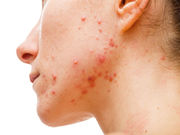Significantly increased risk of developing MDD in first five years after diagnosis; highest risk in first year
FRIDAY, Feb. 9, 2018 (HealthDay News) — Acne is associated with increased probability of developing major depressive disorder (MDD), with risk highest within one year of diagnosis, according to a research letter published online Feb. 7 in the British Journal of Dermatology.
Isabelle A. Vallerand, Ph.D., from the University of Calgary in Canada, and colleagues conducted a retrospective cohort study using data from The Health Improvement Network (THIN), a primary care database in the United Kingdom, for 1986 to 2012. Individuals aged 7 to 50 years with one or more Read codes for acne were identified. Data were included for 134,437 patients with incident acne and 1,731,608 without acne.
The researchers found that the probability of developing MDD was 18.5 and 12 percent among patients with acne and in the general population without acne over the 15-year follow-up period. After adjustment for all covariates, patients with acne had a significantly increased risk of developing MDD only in the first five years after being diagnosed. The highest risk was seen within one year of acne diagnosis (adjusted hazard ratio, 1.63). In the first five years after acne diagnosis, the only covariate producing a confounding effect was sex.
“Given the tremendous burden of MDD and its temporal association with active acne, it is critical that physicians monitor mood symptoms in patients with acne and initiate prompt MDD management or seek consultation from a psychiatrist when needed,” the authors write.
Copyright © 2018 HealthDay. All rights reserved.








